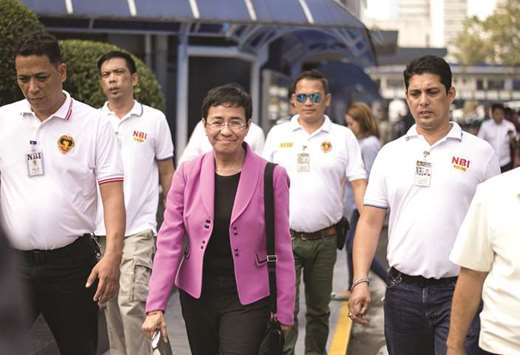The head of a Philippine news site ordered closed for ownership violations met state investigators yesterday to answer what she called a “suspicious complaint” about a five-year-old story, as domestic fears grow of an impending crackdown on media.
Maria Ressa, chief of Rappler (www.rappler.com), maintains that the Jan 11 Securities and Exchange Commission’s revoking of Rappler’s licence was designed to intimidate journalists whose reporting has challenged President Rodrigo Duterte, notorious for his public tirades against opponents.
Journalists held a demonstration on Friday to defend press freedom while media and human rights groups have expressed alarm over what they say is government-led bullying in a country reputed for having one of Asia’s most liberal media environments.
Ressa was met by a phalanx of media after answering a subpoena by the National Bureau of Investigation (NBI) centred on a complaint by a businessmen made last year about a 2012 story.
The NBI’s cybercrime chief, Manuel Antonio Duarte, said the timing was a coincidence and Rappler was being treated fairly.
But Ressa called it “a concerted effort to turn journalism into a crime”.
“Although friendly, I still see this as a continuing pattern to harass and to shut down Rappler,” she said, adding that the involvement of the cyber crime division was a “red flag” for anyone who publishes anything.
The authorities say Rappler is not being punished, but broke the law in 2015 by granting American investor Omidyar Network the means to exercise controls over the news site, or veto powers on company decisions.
Rappler says that is “ludicrous”. Rappler has repeatedly drawn Duterte’s ire and he last week called it a “fake news outlet”. Rappler is operating as normal pending an appeal.
Presidential spokesman Harry Roque said that although Duterte is displeased with some journalists, he has done nothing to stop them.
“If the president wanted to curb press freedom, he could have done it, but he only speaks against the press,” Roque told a regular briefing.
“He has the right to be angry and curse the press.”
Though Duterte has expressed bemusement at allegations he influenced the SEC, the complaint against Rappler was made by his ally, Solicitor General Jose Calida.
Duterte has also vented fury at the Philippine Daily Inquirer, a broadsheet that has reported extensively on his bloody war on drugs, and broadcaster ABS-CBN, the licence of which the president has threatened not to renew in 2020.
Rappler’s reporting has included investigations into what it says is the “weaponising” of the Internet by a government that openly engages and facilitates pro-Duterte bloggers, whose postings have stirred and amplified online hate towards the president’s opponents.
The Paris-based Reporters Without Borders calls that “Duterte’s notorious troll army”. Duterte’s office denies engineering such a system and pro-Duterte bloggers typically say they are not responsible for how trolls behave.
Rappler has been among the hardest hit.
Rappler’s lawyer, Francis Lim, said operations would continue while it takes its case to the appeal court.
Its acting managing editor, Chay Hofilena, said it was prepared for the NBI to start digging into its affairs after the justice minister’s “ominous” instruction last week to look for violations.
“They are after a case. They could be issuing a search warrant. We have to anticipate what these things are,” she said.
Reuters spoke last week with several members of Rappler’s team, who said that though staff were concerned about the future, they continued to report from the field and operate as usual and were reinforcing existing protocols for their personal and information security.
Beyond the president’s office, government agencies were treating them as normal, staff said, despite Duterte’s stinging attack last week, during which he accused Rappler of “throwing trash and **** all along” and writing stories “pregnant with falsity”.
Reporters used to getting bashed online by Duterte’s diehard supporters appeared taken aback by messages of solidarity among media at home and abroad.
“People are thinking this issue is not solely about Rappler,” said one reporter, who declined to be named.
“We were made the example, but there is more to come. I burst into tears because I did not expect that much support.”

CEO of Philippine news website Rappler, Maria Ressa (centre), arrives at the National Bureau of Investigation (NBI) headquarters in Manila, yesterday.
